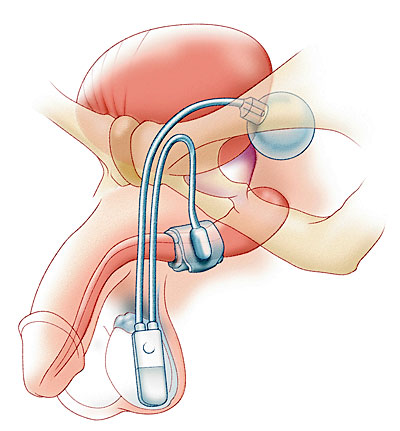 |
 |
 |
 |
 |
 |
Dr. Garber is a Urologist specializing in the following areas:
|
|
 |
Subspecialty Areas » Other Male Urologic Disorders
Dr. Garber also has special interest and over 20 years experience with the treatment of other male Urologic disorders, including the following:
-
"No Scalpel" Vasectomy (NSV).
This minimally invasive technique is done through a 1 centimeter opening in the scrotum, and is generally considered to be the easiest, least painful, and safest way to carry out a vasectomy. NSV can be done in the office, just using local anesthesia. However, some men prefer intravenous sedation, so that they are totally unaware of the procedure. Most men return to normal activities in 24-48 hours.
Prostate Radioactive Seed Implantation (brachytherapy).
When a man is diagnosed with organ-confined prostate cancer,
appropriate treatments include radical prostatectomy (prostate
removal), radiation therapy, and cryo.
Many men prefer to avoid radical prostatectomy if at all possible;
some men decide they prefer radiation therapy. The most convenient
method of radiation therapy for prostate cancer is by radioactive
seed implantation. Under general anesthesia, several small needles
are precisely placed into the prostate, using ultrasound guidance
and computer planning. Through the needles, multiple radioactive
seeds (pellets) are permanently placed into the prostate. These
seeds slowly give off radiation to the prostate and surrounding
tissues. Advantages of radioactive seed implantation over external
beam radiation include the following:
a. seeds are placed in a single treatment; external beam radiation requires daily treatments over roughly 6-7 weeks
b. seeds give a higher dose of radiation to the prostate, and lower dose to surrounding tissues
Dr. Garber was the first Urologist to perform radioactive seed implantation at Graduate Hospital in Philadelphia, and continues to offer this treatment option to men who choose it and are suitable candidates.
Evaluation of Elevated PSA (prostate-specific antigen) levels. PSA is produced by the prostate; elevated levels may be caused by benign (non-cancerous) prostate enlargement, prostate inflammation (prostatitis), or by prostate cancer. Sorting this out often requires an ultrasound-guided prostate biopsy. Dr. Garber now uses local anesthesia injected into the prostate, minimizing the discomfort involved. Many men have told us that our biopsy procedure was much less painful than biopsies done by other doctors.
Urethral Stricture treatment. The male urethra is very prone to developing scar tissue (strictures). Urethral strictures are often caused by prior urethral instrumentation (scope procedures and urethral catheters), or previous urethral infection (such as gonorrhea). This scar tissue narrows the diameter of the urethra internally. Men often notice a decreased force of their urinary stream, dribbling, a sense of incomplete bladder emptying, decreased ejaculation, or a need to strain to urinate. Strictures are easily diagnosed in the office, and usually treated with an outpatient procedure.
Bladder Cancer diagnosis and treatment. Bladder cancer is common in men. Many men are not aware that cigarette smoking is the number one cause of bladder cancer in the USA. Symptoms of bladder cancer include blood in the urine, and other urinary symptoms. Bladder cancer can be easily diagnosed in the office: using local anesthesia, a small fiber-optic scope is passed into the bladder, and bladder tumors can be directly visualized. Once diagnosed, most bladder tumors can be removed painlessly using a scope. Medication can then be instilled into the bladder, to try to prevent bladder cancer recurrence. Smoking-cessation is extremely important in men who have bladder cancer.
-
Peyronie's Disease.
Peyronie’s disease indicates that there is scar tissue involving the penile erection chambers. This scar tissue is underneath the penile skin, and not visible to the naked eye. The scar tissue can often be felt during a Urologic examination. Peyronie’s disease can result in painful erection, curved or asymmetric erection, and impotence. A multitude of medical treatments have been used for men with Peyronie’s disease; however, none have been proven safe and effective. For mild cases, no treatment may be required. For severe cases, a penile implant, possibly combined with a penile straightening procedure, offers the best chance to achieve a straight and stiff erection.
Male Urination Problems. As men age, they often develop urinary problems. Symptoms may include the following:
a. frequent urination
b. getting up at night to urinate
c. inability to control urination, with urine leakage
d. weak stream
e. straining or pushing to urinate
f. urgent urination
g. sensation of incomplete bladder emptying
h. passing blood in the urine
i. burning or painful urination
These symptoms can also occur in men who have had prior urologic surgery.
Evaluation of these symptoms often requires blood and urine testing, along with office procedures called “urodynamics” and “cystoscopy.” Urodynamic testing measures and records bladder filling and emptying. Cystoscopy allows us to look into the urethra, prostate, and bladder with a small scope. These tests, done under local anesthesia, can pinpoint the problem, allowing effective treatment to be initiated.
Post-Prostatectomy Incontinence. Men who have had their prostate removed frequently develop problems with impotence and urinary incontinence. Urine leakage can be a devastating complication for a man. It is embarrassing, creates an unpleasant odor, and may require adult diapers. In addition, urine leakage will undermine a man’s confidence; he will often become depressed, avoiding social and sexual interactions. Dr. Garber has special interest and expertise in helping men correct this embarrassing situation. A thorough urologic evaluation will determine the exact causes of the incontinence. Some men will respond to medication, pelvic floor exercises, or injectable bulking agents. However, the best and most effective treatment for severe post- prostatectomy incontinence is usually a urinary sphincter implant.

AMS 800™ Urinary Control System
Courtesy of American Medical Systems, Inc.
Minnetonka, Minnesota
This device has been available for more than 20 years. It is usually inserted on an outpatient basis, and takes the place of a man’s damaged urinary sphincter mechanism. The device is implanted and de-activated for roughly 6 weeks, to allow healing to occur. The device is then activated during an office visit. Most men report tremendous improvement in their urinary control. This high-tech procedure is covered by many insurance plans. Men who receive the artificial urinary sphincter are usually very grateful for the tremendous improvement in the quality of their lives.
Inguinal Hernia Repair. Groin hernias are extremely common in men. They usually present as a bulge in the groin area (the area above and to the right or left of the penis). Large hernias may extend into the scrotum. Dr. Garber has received special training in the repair of these hernias using the “patch and plug” technique. This technique uses minimal tissue dissection and is “tension-free.” Most repairs are done on an outpatient basis, with minimal post-operative pain and discomfort. Men are often able to resume normal activities within 2-3 weeks of their hernia repair. To see step-by-step diagrams of an inguinal hernia repair, click here.
|
 |
Dr. Bruce B. Garber
Box 686
Bryn Mawr, PA 19010
610-613-9251 Phone
urologicsurgeons@comcast.net Email
|
NEW: Click here to get information
about scheduling
a confidential,
online
videoconference with Dr. Garber!
|


